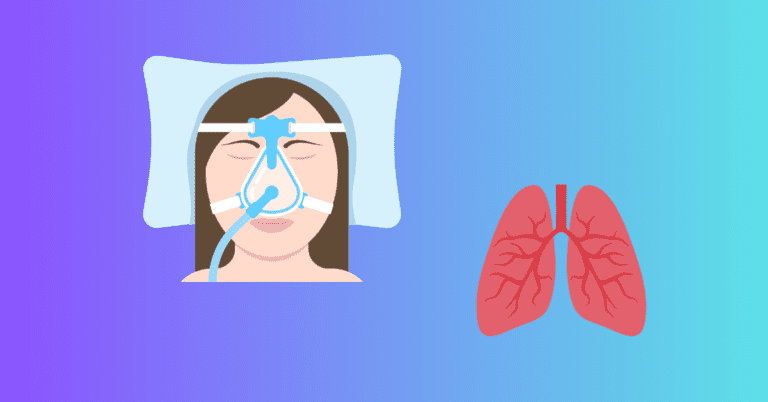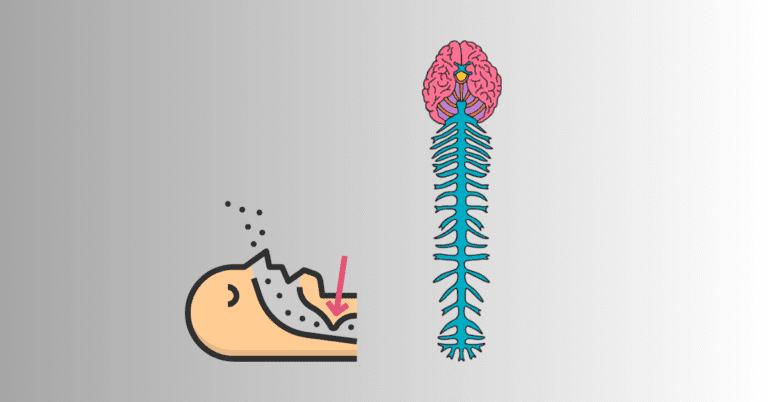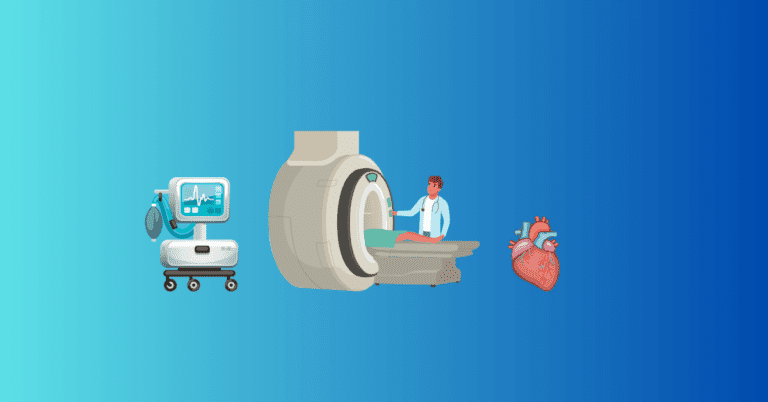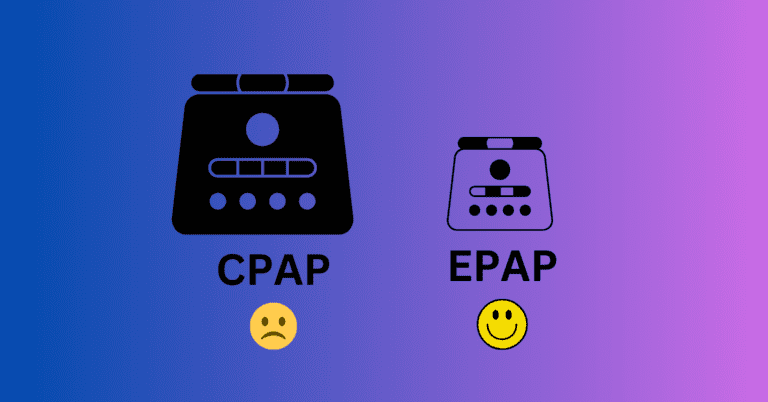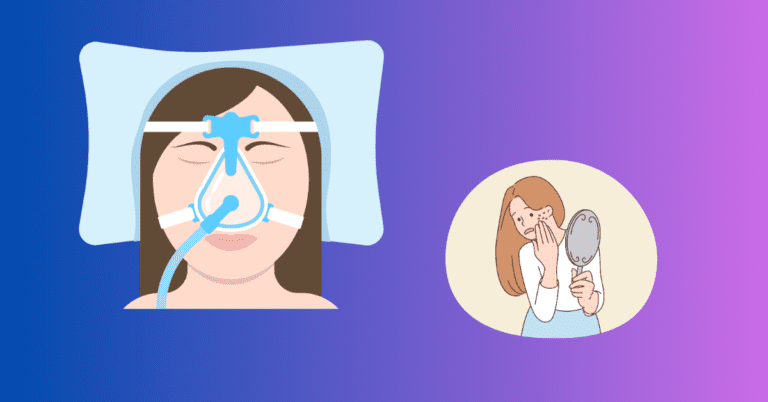What is Sleep? And how we can control it for our benefit
Jeremy Smith is a long-term CPAP user and sleep apnea advocate. After being diagnosed with severe obstructive sleep apnea, he created ByJeremySmith.com to help others navigate CPAP therapy through personal stories, gear reviews, and practical advice.
Sleep has fascinated me for a long time. If we as humans could risk being attacked or eaten for one-third of every day of our lives because our bodies become paralyzed as we sleep, it must be extremely important in evolution.
Only now are we learning what sleep is, why we need it, and what happens when we do sleep. In this article, I want to crack open sleep and explore this strange phenomenon that visits us daily and whose quality affects our awake hours.

This is a big article because I wanted to cover everything I could discover about sleep. For that reason, here is a table of contents so you can either read the whole article or choose the particular aspect of sleep that interests you.
What is Sleep?
Sleep is a natural state of rest essential for the survival of nearly all animals, including humans.
Far from being a passive state, sleep is an active, complex process where our body and mind work together to maintain health, balance, and energy. Sleep has evolved as an essential function, so crucial that we dedicate a third of our lives to it.
From restoring energy and enhancing brain function to supporting emotional stability, sleep is deeply embedded in our biology.
Why Do We Sleep? The Evolutionary Perspective
Scientists believe sleep evolved as a protective and restorative behavior. Early humans, exposed to threats like predators and environmental dangers, developed sleep patterns to help avoid these hazards.
At night, when visibility is limited, staying inactive and sheltered lowered the risk of encounters with nocturnal predators. This “protective” aspect of sleep, as well as the energy conservation it provides, may be why it became hardwired into our biology.
Beyond protection, sleep also supports fundamental physiological processes:
- Physical Recovery: During sleep, muscles repair, cells regenerate, and the immune system strengthens, all of which are essential for survival and health.
- Brain Maintenance: Sleep removes waste from the brain, clearing out toxins that accumulate during wakefulness. This “housekeeping” function is crucial for preventing neurodegenerative diseases.
- Cognitive and Emotional Processing: REM sleep, often called “dream sleep,” processes emotional experiences, integrating them into memory and helping us handle stress.
The Importance of Sleep for Health and Well-being
Today, the role of sleep is more critical than ever, with quality sleep linked to better health, longevity, and life satisfaction.

This is me. Sleep has been a challenge to me for a long time. You can read my story here. I have severe obstructive sleep apnea which I will discuss later in this article. In a nutshell, my sleep was awful for many years, and when I was awake I felt tired and barely able to get through the day.
From physical vitality to mental clarity, sleep underpins nearly every aspect of our lives. Sleep deprivation, by contrast, is linked to a range of health issues, including obesity, diabetes, cardiovascular disease, and mood disorders.
Getting good sleep isn’t just a luxury; it’s a necessity for a healthy, balanced life.
The Science of Sleep
How Does the Brain Control Sleep?
Sleep isn’t just about turning off your brain for the night; it’s a carefully managed process with different parts of the brain working together to guide you through different stages of rest.

Here’s a breakdown of the key players:
- Suprachiasmatic Nucleus (SCN): Think of this tiny part of your brain as a “master clock.” It’s responsible for keeping you on a 24-hour schedule, known as your circadian rhythm, which tells your body when to sleep and wake up. The SCN responds to light and dark signals from the eyes, which is why getting morning sunlight helps wake you up and why avoiding bright screens at night can make it easier to fall asleep.
- Hypothalamus: This area controls lots of important functions in your body, including sleep. It’s like the brain’s traffic director, sending out signals when it’s time to sleep and release melatonin (a hormone that helps you get sleepy).
- Brainstem: The brainstem helps you switch between being awake and asleep. It also controls basic body functions like breathing and heart rate, which naturally slow down as you relax into sleep.
- Thalamus: When you’re awake, the thalamus sends information from your senses (like sight and sound) to other parts of the brain. But during sleep, it blocks most of this information so you aren’t disturbed by what’s happening around you. In REM sleep (the stage where we dream), the thalamus becomes active again, which could be why dreams can feel vivid and real.
- Cerebral Cortex: This is the brain’s outer layer and where higher functions like thinking, memory, and problem-solving happen. When you’re awake, your cortex is busy processing everything you see, hear, and do. But during sleep, it’s mostly quiet, allowing the brain to focus on organizing memories and other things learned during the day. In REM sleep, however, the cortex becomes active again, which is linked to dreaming.
How Chemicals in the Brain Affect Sleep
Various chemicals in your brain play a role in making you feel awake or sleepy. Here are a few of the most important ones:
- Melatonin: Known as the “sleep hormone,” melatonin is produced in response to darkness and helps you wind down for sleep. If you’re exposed to bright lights at night, like from your phone or computer, melatonin production can be delayed, making it harder to fall asleep.
- Adenosine: This chemical builds up in your body throughout the day and creates what’s called “sleep pressure,” or the natural feeling of needing to sleep. When you go to sleep, adenosine levels drop, which is why you feel refreshed in the morning. Caffeine blocks adenosine, which is why drinking coffee or soda can make you feel more awake.
- GABA: This is a calming chemical that helps slow down brain activity so you can relax. It’s especially high during the start of sleep, helping you ease into rest. GABA is also used in some sleep aids to help people relax and fall asleep faster.
- Cortisol: This is a “wake-up” hormone that usually peaks in the morning to help you feel alert. But if you’re stressed, your body can release cortisol at night, which can make it hard to sleep. Finding ways to relax can help keep cortisol in check and improve your sleep quality.
- Serotonin: Known as a “happy” chemical, serotonin helps regulate your mood. In the evening, some serotonin turns into melatonin, signaling the body that it’s time to rest.
- Orexin: This chemical helps keep you awake during the day. It also prevents unexpected “sleep attacks,” which can happen in a condition called narcolepsy, where orexin levels are unusually low.
How Brain Waves Change Across Sleep Stages
Throughout the night, your brain produces different types of waves (or electrical patterns), which change as you move through the stages of sleep.
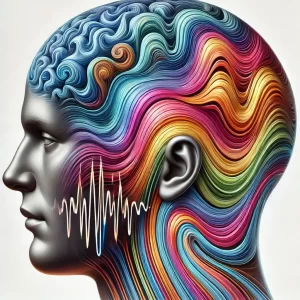
Here’s a look at each type:
- Beta Waves: Fast brain waves that happen when you’re awake and alert.
- Alpha Waves: These are slower than beta waves and happen as you start to relax, like when you close your eyes before drifting off.
- Theta Waves: These waves are slower and appear when you’re in light sleep (Stage 1).
- Delta Waves: These are the slowest waves, showing up in deep sleep (Stage 3). Delta waves help the brain and body recover from the day’s activities.
- Sawtooth Waves: Unique to REM sleep, these waves appear during the stage when dreaming happens.
As you move through these waves, your body and brain complete important work that helps keep you healthy, mentally sharp, and emotionally balanced.
The Brain’s “Cleaning System” During Sleep
During sleep, the brain has its own cleaning system, known as the glymphatic system. It clears out waste and toxins that build up throughout the day. When we sleep, brain cells shrink slightly, creating space for cerebrospinal fluid to flush out toxins, including beta-amyloid, which is linked to Alzheimer’s disease. This process only happens during sleep, making good rest essential for brain health in the long run.
How Sleep Helps the Brain Grow and Learn
In sleep, the brain undergoes something called synaptic pruning, where it strengthens useful connections and gets rid of unimportant ones. This allows the brain to stay flexible and adapt to new information. This process, called neuroplasticity, keeps the brain’s networks organized and efficient, which is important for learning and problem-solving.
How Sleep Affects Your Genes
When you sleep, the body’s genetic activity changes, affecting things like metabolism, immune function, and stress response. Sleep affects the expression of thousands of genes, meaning even one night of poor sleep can disrupt processes linked to inflammation, cell repair, and stress.
By understanding how all these parts work together, we can see just how active the brain is during sleep and why good sleep is so important for our overall well-being.
Sleep Stages and Cycles
What Are the Stages of Sleep?
Sleep happens in different stages, each one playing a unique role in helping your body and brain recover.
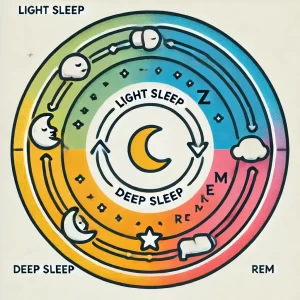
During a typical night, your body goes through these stages in cycles that last about 90 minutes. These cycles repeat around 4-6 times each night. Here’s a closer look at each stage:
- Stage 1 (Light Sleep): This is the first stage when you start to doze off. It only lasts for about 5-10 minutes. Your breathing slows down, your muscles start to relax, and your body temperature begins to drop. You’re still aware of your surroundings, so small sounds might wake you up at this point. This stage is kind of like dipping your toes into the water of sleep.
- Stage 2 (Moderate Sleep): In this stage, you’re fully asleep but still in a fairly light stage. Your body temperature continues to drop, and your heart rate slows even more. This stage helps the brain start to process memories and improve motor skills (like playing sports or learning new dance moves). You spend most of your night in Stage 2, about 45-50% of the total time, which is why it’s so important for feeling rested.
- Stage 3 (Deep Sleep): Also known as “slow-wave sleep” because of the slow brain waves your brain produces, this stage is the deepest, most restorative stage of sleep. In Stage 3, your body does important repair work—cells and tissues get fixed, muscles recover, and your immune system gets a boost. This stage is also important for keeping your mind sharp and supporting memory. If you wake up from this stage, you might feel groggy or disoriented, a feeling called “sleep inertia.”
- REM Sleep (Rapid Eye Movement): REM sleep is the stage where most dreaming happens. During REM, your eyes move quickly under your eyelids (hence, Rapid Eye Movement), and brain activity is high, almost like when you’re awake. Even though your brain is active, your body is essentially “paralyzed,” which keeps you from acting out your dreams. REM sleep helps process emotions, form memories, and boost creativity. REM stages get longer as the night goes on, with the first cycle lasting around 10 minutes and the final one closer to an hour.
What’s a Sleep Cycle?
A sleep cycle includes all the stages of sleep, moving from light sleep to deep sleep and then into REM sleep. Each cycle takes about 90 minutes, and your body repeats these cycles throughout the night. Here’s what each cycle usually looks like:
- Beginning of the Night: During the first few cycles, you spend more time in deep sleep (Stage 3), which is the stage that helps your body recover and grow.
- Middle of the Night: As the night progresses, you start spending less time in deep sleep and more time in REM sleep. This shift happens naturally and helps the brain focus on memory processing, emotions, and creativity.
- End of the Night: By the last few cycles, most of your sleep is spent in light sleep and REM. This is why people often remember dreams when they wake up in the morning—REM stages are longer toward the end of the night.
Why Each Stage Matters
Each sleep stage does something different but equally important for our bodies and minds:
| Sleep Stage | Description | Role in Sleep Health |
|---|---|---|
| Stage 1 (Light Sleep) | The transition from wakefulness to sleep; lasts 5-10 minutes with slowed breathing and relaxed muscles. | Eases you into sleep; light rest that’s easily interrupted. |
| Stage 2 (Moderate Sleep) | Fully asleep but in a lighter sleep phase; body temperature and heart rate drop; takes up about 45-50% of sleep time. | Supports memory processing and motor skills; prepares body for deeper sleep. |
| Stage 3 (Deep Sleep) | Known as “slow-wave sleep”; deep, restorative sleep with very slow brain waves. | Essential for physical recovery, immune support, and memory. Waking from this stage can cause grogginess (sleep inertia). |
| REM Sleep | High brain activity, with rapid eye movement and most dreaming occurring; stages get longer as the night progresses. | Important for emotional processing, creativity, and memory consolidation. Muscle relaxation prevents acting out dreams. |
What Happens If You Don’t Get Enough of Each Stage?
Missing out on any of these stages can affect your health. For example:
- If you don’t get enough deep sleep, you may feel physically tired and less energized.
- If REM sleep is cut short, you might struggle with memory, creativity, and managing emotions.
Why Do We Wake Up During the Night?
Waking up briefly between cycles is normal and part of a healthy sleep pattern. Most of the time, these wake-ups are so quick that we don’t even remember them.
However, stress, noise, or discomfort can make it harder to fall back asleep, interrupting the natural flow of sleep stages.
Understanding sleep stages and cycles can help you improve your sleep habits, so you wake up feeling refreshed and ready to take on the day. Each stage plays a part in keeping you healthy, so getting enough of each is key to feeling your best.
Types of Sleep Patterns
Sleep patterns refer to the ways we schedule our sleep throughout a 24-hour period.
While most people follow a single block of nighttime sleep, known as monophasic sleep, there are several other sleep patterns, each with its own unique benefits, challenges, and health impacts.
1. Monophasic Sleep
Monophasic sleep is the most common sleep pattern in modern society, where people sleep for one continuous period, usually at night, typically lasting 7-9 hours. This sleep pattern aligns with our natural circadian rhythm, which is synchronized to a 24-hour day-night cycle. Most adults and adolescents follow this pattern, especially in cultures that prioritize a daytime work schedule.
Benefits:
- Fits well with standard school and work schedules.
- Aligns with the body’s natural circadian rhythm.
- Allows for complete cycles of all sleep stages, including deep sleep and REM, which are essential for physical and mental recovery.
Challenges:
- Those with irregular schedules (like shift workers) may struggle with this pattern.
- Monophasic sleep can be harder to maintain for individuals with insomnia or other sleep disorders.
2. Biphasic Sleep
Biphasic sleep involves sleeping in two separate segments. Often, this includes a core sleep period at night, followed by a shorter nap during the day. This pattern is commonly seen in cultures where an afternoon nap or siesta is part of daily life, especially in regions with warmer climates, where people may rest during the hottest part of the day.
Common Biphasic Sleep Patterns:
- Core Sleep + Nap: 5-6 hours of core sleep at night, followed by a 1-2 hour nap during the day.
- Siesta Sleep: Typically involves a full night’s sleep of 6-7 hours, with a shorter nap (15-30 minutes) in the afternoon.
Benefits:
- The afternoon nap can improve alertness, mood, and cognitive function, especially in people who experience an energy slump in the afternoon.
- Can improve overall productivity and energy levels by breaking up the day.
- Helps people who have difficulty getting all their sleep in one block, providing a second opportunity for rest.
Challenges:
- Not always compatible with work or school schedules.
- The timing of the nap is essential; naps that are too late in the day can interfere with nighttime sleep.
3. Polyphasic Sleep
Polyphasic sleep involves multiple sleep periods throughout the day and night, rather than one long block of sleep. Some people follow a highly structured polyphasic sleep pattern with several scheduled naps in addition to core sleep, while others simply take naps as needed.
Types of Polyphasic Sleep Patterns:
- Everyman Sleep Schedule: Involves a core sleep period of 3-4 hours at night and 2-3 short naps (20 minutes) spread throughout the day.
- Dymaxion Sleep Schedule: Involves taking four 30-minute naps every six hours, resulting in only 2 hours of sleep per day. This is one of the most extreme polyphasic schedules and is not generally recommended for long-term health.
- Uberman Sleep Schedule: Consists of 6-8 naps of 20-30 minutes each, spaced evenly throughout the day, with no core sleep period. This schedule reduces total sleep to around 2-3 hours and requires strict adherence.
Benefits:
- Can provide more waking hours, which some people use for additional work, study, or hobbies.
- Can help individuals with unique schedules, such as shift workers, find opportunities to rest in non-traditional ways.
- Some people report feeling very alert and energized after adjusting to certain polyphasic schedules.
Challenges:
- Very difficult to maintain over time; even minor changes in schedule can disrupt the pattern.
- Lack of deep sleep stages, particularly slow-wave (Stage 3) sleep, which is vital for physical recovery, immune function, and overall health.
- Long-term effects are not well-studied, but there is concern that polyphasic sleep may lead to health problems, particularly for people who miss out on sufficient deep and REM sleep.
4. Segmented Sleep
Segmented sleep, sometimes called bimodal or first and second sleep, is a pattern where people naturally wake up in the middle of the night, stay awake for an hour or two, and then return to sleep. This pattern was common in pre-industrial times and is thought to be a more natural sleep cycle for humans. People would sleep in two segments: an early “first sleep” and a “second sleep” after a brief period of wakefulness.
Benefits:
- May feel more natural for some people, especially those who wake up in the middle of the night and have difficulty going back to sleep.
- Allows people to use the waking period for quiet activities like reading, journaling, or meditation, which can be a calming and reflective time.
- Some find it reduces anxiety around waking up during the night, as they view it as a natural part of their routine rather than insomnia.
Challenges:
- Not always compatible with modern work schedules or social norms.
- Requires careful management of lighting, noise, and activities during the waking period to avoid fully waking up.
- For people with strict early morning schedules, this pattern may be disruptive.
Choosing the Right Sleep Pattern for Your Lifestyle
The “best” sleep pattern largely depends on individual lifestyle, work demands, and health needs. While monophasic sleep is most common and generally considered ideal for meeting all sleep stages, some people find that biphasic or polyphasic patterns better suit their unique situations.
Considerations for Choosing a Sleep Pattern:
- Work or School Schedule: Monophasic or biphasic sleep may be the best fit for traditional schedules, while polyphasic patterns might be helpful for those with highly flexible or unusual schedules.
- Health Needs: Some patterns, like polyphasic sleep, may not allow for enough deep or REM sleep, which are crucial for physical recovery and memory. People with chronic health conditions should prioritize patterns that allow for full sleep cycles.
- Social Life and Family Obligations: Segmented or biphasic sleep patterns may align with lifestyles that include early morning or late-night commitments, while monophasic sleep might work better for structured, daytime routines.
Sleep Needs Across the Lifespan
Our sleep needs change as we grow, reflecting different demands on the body and brain at each stage of life. From the intense growth in infancy to the stability of adulthood and adjustments in later years, each age brings unique requirements for healthy, restful sleep.
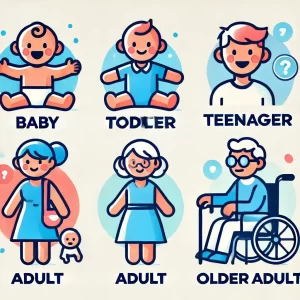
1. Infants (0–12 Months)
Infants need a lot of sleep—about 14-17 hours each day.
This high requirement is due to rapid growth and brain development during the first year of life.
Sleep for infants isn’t consolidated in a single block but instead happens in several shorter periods, including naps throughout the day. Newborns may sleep for 2-4 hours at a time due to needing regular feedings.
Why Sleep is Important for Infants:
- Brain Development: Infants’ brains are rapidly developing; sleep supports synapse formation, helping them process new sensory information.
- Physical Growth: Growth hormones are released during deep sleep, helping babies grow.
- Emotional Regulation: Babies who sleep well are often better able to regulate emotions, while poor sleep can lead to irritability and difficulty settling.
Challenges:
- Frequent night waking due to feeding needs.
- Developmental milestones like teething can disrupt sleep patterns.
- Parents may face their own sleep difficulties due to the demands of infant care.
Sleep Tip for Infants: Establishing a consistent bedtime routine early on can help infants recognize sleep cues, making it easier to settle down for naps and nighttime sleep as they grow.
2. Toddlers (1–3 Years)
Toddlers typically need 11-14 hours of sleep, including one or two naps during the day. By this age, children often consolidate most of their sleep into one long nighttime stretch, but naps still play a crucial role in meeting their sleep needs.
Why Sleep is Important for Toddlers:
- Cognitive Development: Sleep aids memory consolidation, helping toddlers learn language, motor skills, and social interactions.
- Physical Activity: Toddlers are active explorers; sleep helps restore energy for physical play.
- Behavioral Control: Adequate sleep helps toddlers regulate emotions, reducing tantrums and improving mood.
Challenges:
- Separation anxiety or fear of missing out can make bedtime difficult.
- Changes in routine, like daycare, can affect sleep consistency.
- Potty training and new abilities like climbing out of bed may disrupt sleep.
Sleep Tip for Toddlers: A calming pre-sleep routine (like reading a story or singing) and consistent sleep environment can help toddlers settle down and feel secure.
3. Preschoolers (3–5 Years)
Preschoolers need about 10-13 hours of sleep. Many at this stage may begin to phase out daytime naps, though some still benefit from a short nap in the afternoon.
Why Sleep is Important for Preschoolers:
- Learning and Memory: Sleep helps preschoolers retain new information and skills they pick up in school or play.
- Growth and Immunity: Physical growth is supported by sleep, which aids in tissue repair and boosts the immune system.
- Mood and Behavior: Adequate sleep is linked to better mood, less irritability, and improved social skills.
Challenges:
- Nighttime fears or bad dreams can become more common at this age.
- Bedtime resistance, often a sign of developmental independence.
- Irregular schedules due to family events or holidays can disrupt routine.
Sleep Tip for Preschoolers: A set bedtime and a winding-down period before bed help children feel relaxed and ready for sleep. Keeping to a consistent routine, even on weekends, supports healthy sleep habits.
4. School-Aged Children (6–12 Years)
School-aged children require 9-11 hours of sleep. At this stage, sleep becomes more consolidated in one long nighttime block, with naps no longer common. Sleep during these years is essential for both academic learning and physical development.
Why Sleep is Important for School-Aged Children:
- Academic Performance: Sleep improves attention, memory, and problem-solving skills, which are critical for learning.
- Physical Health: Growth continues, and sleep supports immune function, energy, and physical recovery.
- Emotional Stability: Adequate sleep reduces the likelihood of behavioral issues and promotes better emotional control.
Challenges:
- Increased homework or extracurricular activities can cut into sleep time.
- Growing use of screens can delay melatonin release, making it harder to fall asleep.
- Social interactions, peer pressure, and busy schedules can disrupt routines.
Sleep Tip for School-Aged Children: Limiting screen time at least an hour before bed, and encouraging quiet activities (like reading) can make it easier for children to wind down and get the sleep they need.
5. Teenagers (13–18 Years)
Teenagers need about 8-10 hours of sleep, though many get less. The teenage years are marked by biological changes in the circadian rhythm, leading to a natural preference for later bedtimes and wake times. Known as delayed sleep phase syndrome, this shift often results in teens staying up late and struggling with early school start times.
Why Sleep is Important for Teenagers:
- Mental Health: Sleep supports emotional regulation, reducing the risk of mood disorders like anxiety and depression.
- Academic Success: Proper rest improves concentration, memory, and academic performance.
- Growth and Development: Growth hormones are active during sleep, supporting physical development and muscle growth.
Challenges:
- Biological tendency to stay up later conflicts with early school start times.
- Increased demands from school, extracurriculars, social life, and sometimes jobs.
- Screen time and social media can interfere with sleep onset and quality.
Sleep Tip for Teenagers: Encourage a wind-down routine and reduce screen time before bed. Teens can also try to maintain a regular sleep schedule on weekends to avoid “sleep debt.”
6. Adults (18–64 Years)
Most adults need around 7-9 hours of sleep each night. Unlike children, adults have stable circadian rhythms that generally match the day-night cycle, though sleep preferences can vary (e.g., morning people vs. night owls). The balance of work, family, and personal obligations often impacts sleep quality for adults.
Why Sleep is Important for Adults:
- Cognitive Function: Sleep improves memory, focus, and decision-making skills.
- Physical Health: Quality sleep supports immune function, cardiovascular health, and metabolism.
- Emotional Well-being: Adequate rest helps manage stress and maintains a balanced mood.
Challenges:
- Work obligations, parenting, and other responsibilities often cut into sleep time.
- Poor sleep hygiene habits (such as late caffeine or screen exposure) can affect sleep quality.
- Stress and anxiety may lead to insomnia or difficulty staying asleep.
Sleep Tip for Adults: Regular sleep and wake times, along with a comfortable, cool sleep environment, can promote better rest. Avoiding heavy meals and caffeine late in the day also supports quality sleep.
7. Older Adults (65+ Years)
Older adults generally need 7-8 hours of sleep, though they may experience changes in sleep patterns, such as waking up earlier and sleeping in shorter segments. Aging affects the body’s production of sleep-inducing hormones, like melatonin, and can lead to more fragmented sleep.
Why Sleep is Important for Older Adults:
- Memory and Cognitive Health: Sleep helps reduce the risk of cognitive decline and conditions like dementia.
- Physical Recovery: Aging bodies need sleep to repair cells and boost immune function.
- Mental Health: Quality sleep reduces risks of depression and anxiety in later years.
Challenges:
- Health conditions like arthritis, sleep apnea, and restless legs syndrome can disrupt sleep.
- Frequent nighttime awakenings can lead to reduced sleep quality.
- Daytime fatigue may lead to naps, which can interfere with nighttime rest.
Sleep Tip for Older Adults: Maintaining a consistent sleep schedule, limiting naps, and creating a calm bedtime routine can improve sleep quality. Consulting with a doctor about any chronic sleep disturbances may also be beneficial.
Factors Affecting Sleep Quality
Sleep quality is influenced by a combination of environmental, lifestyle, physical, and mental factors. Understanding these influences can help in making adjustments that lead to more restful and restorative sleep. Here’s a deep dive into the major factors affecting sleep and practical tips to improve each one.
1. Environmental Factors
The sleep environment plays a crucial role in determining how easily you fall asleep and how restful your sleep is. Key environmental factors include:
- Light Exposure: Light is one of the strongest signals to our circadian rhythm. Exposure to bright light in the evening—especially blue light from screens—can disrupt melatonin production, making it harder to fall asleep. On the other hand, getting natural light exposure in the morning helps set your internal clock and promotes wakefulness.
- Sleep Tip: Limit screen time at least an hour before bed and consider using dim, warm lighting in the evening. Blackout curtains can also help block light, creating a darker environment conducive to sleep.
- Temperature: Your body temperature naturally drops to initiate sleep, and a cool room environment helps facilitate this. The ideal bedroom temperature is usually between 60-67°F (15-19°C).
- Sleep Tip: Adjust your thermostat to create a cool, comfortable sleep environment. Light, breathable bedding and using a fan for air circulation can further improve comfort.
- Noise Levels: Sudden noises or background noise can disrupt sleep, even if you don’t fully wake up. Consistent noise levels, however, can mask disruptions and promote better sleep.
- Sleep Tip: Use white noise machines, earplugs, or a fan to create a steady sound environment. White noise can help mask sudden sounds that might otherwise wake you up.
- Mattress and Bedding Quality: A comfortable, supportive mattress and pillows tailored to your sleep position can reduce discomfort and improve sleep quality.
- Sleep Tip: Replace your mattress every 7-10 years or if it feels saggy or uncomfortable. Choose pillows that align with your sleeping style—firmer for side sleepers, softer for back or stomach sleepers.
2. Lifestyle Factors
Your daily habits and routines also play a significant role in how well you sleep. Key lifestyle factors include:
- Diet: What and when you eat impacts your ability to fall and stay asleep. Heavy, spicy, or acidic meals close to bedtime can cause indigestion, while a diet high in sugar and caffeine may lead to disrupted sleep.
- Sleep Tip: Avoid large meals, caffeine, and sugary snacks in the 4-6 hours before bedtime. If you’re hungry close to bedtime, opt for a light snack like a banana or a small bowl of oatmeal, which contains sleep-supportive nutrients.
- Exercise: Regular physical activity is associated with better sleep quality and improved mood. Exercise helps to relieve stress and increase sleep pressure, making it easier to fall asleep. However, vigorous exercise too close to bedtime may have an alerting effect.
- Sleep Tip: Aim for 30 minutes of moderate exercise daily, preferably in the morning or early afternoon. If you prefer evening workouts, choose low-impact activities like yoga or stretching.
- Screen Time and Technology Use: Blue light from phones, tablets, and computers suppresses melatonin and tricks the brain into thinking it’s still daytime.
- Sleep Tip: Limit screen exposure at least an hour before bed. Consider using blue light filters on devices or wearing blue light-blocking glasses in the evening.
3. Physical Health Factors
Certain physical health issues can disrupt sleep quality, either directly or indirectly. Common physical health factors that impact sleep include:
- Chronic Pain: Conditions like arthritis, back pain, and fibromyalgia can make it difficult to find a comfortable sleep position, leading to frequent awakenings.
- Sleep Tip: If chronic pain is affecting your sleep, talk to a healthcare provider about pain management strategies. Sleeping with supportive pillows and practicing relaxation techniques before bed can also help alleviate discomfort.
- Respiratory Issues: Conditions like asthma, allergies, and sleep apnea interfere with breathing during sleep, causing poor sleep quality and daytime fatigue.
- Sleep Tip: For sleep apnea, consider using CPAP therapy or other medical treatments. Keep your sleeping area clean to reduce allergens, and consult with a healthcare provider if respiratory issues persist.
- Menstrual Cycle and Menopause: Hormonal changes throughout the menstrual cycle or due to menopause can cause sleep disturbances. Fluctuations in estrogen and progesterone impact body temperature and mood, making restful sleep more challenging.
- Sleep Tip: Keeping a sleep diary may help identify patterns linked to your cycle. Cooling bedding and managing symptoms, like hot flashes, can also improve sleep during hormonal changes.
4. Mental Health and Emotional Factors
Your mental and emotional state has a profound effect on sleep quality. High-stress levels, anxiety, and depression are commonly linked to sleep disturbances. Here are some key aspects:
- Stress: Chronic stress increases cortisol levels, which can disrupt sleep by making it harder to relax and fall asleep. The more stressed you are, the harder it is to achieve the calm state needed for sleep.
- Sleep Tip: Incorporate stress management techniques into your day, such as deep breathing exercises, meditation, or journaling. Creating a wind-down routine that includes relaxation activities can also signal to your body that it’s time for rest.
- Anxiety and Racing Thoughts: Anxiety can make it challenging to relax, causing racing thoughts that prevent you from drifting off or keep you in a light sleep state.
- Sleep Tip: If racing thoughts keep you awake, try writing down your worries in a notebook before bed. Practicing mindfulness or progressive muscle relaxation can also ease anxiety and improve sleep quality.
- Depression: Depression can lead to both insomnia and hypersomnia (excessive sleepiness). Those with depression often experience fragmented sleep, reduced REM sleep, and less restful sleep overall.
- Sleep Tip: Seek support from a mental health professional if depression affects your sleep. Establishing a regular routine, with consistent sleep and wake times, may also help stabilize sleep patterns.
5. Irregular Sleep Patterns and Circadian Rhythm Disruptions
The circadian rhythm is our internal clock that helps regulate sleep-wake cycles. Disruptions to this rhythm can make it difficult to fall asleep and wake up at consistent times. Common disruptions include:
- Shift Work: Those who work late-night or rotating shifts are at a higher risk for sleep disorders due to irregular sleep patterns and exposure to light during nighttime hours.
- Sleep Tip: For shift workers, using blackout curtains and sticking to a regular sleep schedule (even on days off) can improve sleep. Try to get bright light exposure during your wake period to signal alertness to your body.
- Jet Lag: Traveling across time zones disrupts the body’s natural rhythm, often resulting in difficulty sleeping in the new time zone.
- Sleep Tip: When traveling, try to get exposure to sunlight in your new time zone and adjust your schedule gradually. Melatonin supplements can also help shift your rhythm.
- Social Jet Lag: Social jet lag occurs when people shift their sleep patterns on weekends, staying up later and sleeping in. This pattern can make it harder to return to a regular weekday schedule.
- Sleep Tip: Try to keep your weekend and weekday sleep schedules similar, with no more than an hour difference, to minimize disruptions.
6. Poor Sleep Hygiene
“Sleep hygiene” refers to the habits and practices that support good sleep. Poor sleep hygiene can contribute to difficulty falling asleep and staying asleep. Common sleep hygiene issues include inconsistent bedtimes, poor pre-sleep routines, and overstimulation close to bedtime.
Sleep Hygiene Tips:
- Stick to a Sleep Schedule: Go to bed and wake up at the same time each day, even on weekends. This helps reinforce your body’s natural sleep-wake cycle.
- Create a Relaxing Bedtime Routine: Activities like reading, taking a warm bath, or meditating can signal to your body that it’s time to wind down.
- Limit Caffeine and Alcohol: Avoid caffeine at least six hours before bedtime. While alcohol might make you feel sleepy initially, it can lead to fragmented sleep.
- Reserve the Bed for Sleep Only: Avoid watching TV, working, or eating in bed. Associating the bed only with sleep helps condition your brain to view it as a place for rest.
- Limit Fluids Before Bed: Drinking too much close to bedtime can lead to frequent trips to the bathroom, interrupting sleep.
Addressing these factors can significantly improve sleep quality and help create a stable, restful sleep pattern.
By making adjustments to your environment, lifestyle, and sleep hygiene, and by managing physical and mental health, you can set yourself up for consistently better sleep and improved overall health.
Common Sleep Disorders
Sleep disorders are conditions that affect how well we sleep, often leading to poor quality rest, daytime fatigue, and health complications over time.
Here’s a look at the most common sleep disorders, including Obstructive Sleep Apnea (OSA)—a condition I also live with and have learned to manage effectively.
1. Obstructive Sleep Apnea (OSA)
What is OSA? Obstructive Sleep Apnea (OSA) is a disorder where breathing repeatedly stops and starts during sleep due to a blocked airway. This blockage often occurs when the throat muscles relax too much, causing soft tissues to collapse and obstruct airflow. The brain senses this lack of oxygen, causing a brief awakening to reopen the airway, often accompanied by loud snoring or gasping sounds. The severity of sleep apnea is measured by the AHI index.
Personal Insight: Living with OSA I was diagnosed with severe OSA, and starting CPAP therapy changed my life.

Before treatment, I’d wake up with headaches, and I often felt exhausted even after a full night’s sleep. Learning to adjust to a CPAP machine was a process, but over time, it improved my energy levels, mood, and overall health significantly.
Symptoms of OSA:
- Loud snoring
- Gasping or choking during sleep
- Frequent awakenings, often without realizing it
- Morning headaches and dry mouth
- Daytime sleepiness and difficulty concentrating
Health Risks Associated with OSA: Untreated OSA can increase the risk of serious health issues like high blood pressure, heart disease, stroke, diabetes, and even depression. The constant interruptions in breathing can strain the cardiovascular system, while poor sleep quality impacts mental health.
Diagnosis and Treatment: Diagnosis typically involves an overnight sleep study, which monitors breathing, heart rate, oxygen levels, and sleep stages. Treatment options include:
- CPAP Therapy (Continuous Positive Airway Pressure): A CPAP machine delivers air through a mask, keeping the airway open. It’s the gold standard for OSA treatment, and although it may take some time to adjust, it can be life-changing.
- Lifestyle Changes: Losing weight, quitting smoking, and avoiding alcohol close to bedtime can reduce symptoms.
- Oral Appliances: Mouthguards or oral appliances are designed to reposition the jaw and tongue, helping keep the airway open.
- Surgery: In severe cases, surgeries like uvulopalatopharyngoplasty (UPPP) or upper airway stimulation might be considered.
2. Insomnia
What is Insomnia? Insomnia is the most common sleep disorder, characterized by difficulty falling asleep, staying asleep, or waking up too early and not being able to go back to sleep. It can be acute (short-term) or chronic (lasting over three months). Insomnia is often related to stress, anxiety, poor sleep habits, or lifestyle factors.
Symptoms of Insomnia:
- Taking a long time to fall asleep (over 30 minutes)
- Waking up frequently during the night
- Waking up too early without feeling refreshed
- Feeling fatigued, irritable, or having trouble focusing during the day
Health Risks Associated with Insomnia: Long-term insomnia can lead to chronic fatigue, lowered immunity, anxiety, depression, and even an increased risk of cardiovascular disease. Lack of sleep impairs cognitive function and overall quality of life.
Treatment Options:
- Cognitive Behavioral Therapy for Insomnia (CBT-I): This is the most effective treatment, involving techniques to change thought patterns and behaviors that interfere with sleep.
- Lifestyle Adjustments: Reducing caffeine, creating a bedtime routine, and practicing relaxation techniques can improve sleep quality.
- Medication: In some cases, doctors may prescribe sleep aids, though these are typically for short-term use.
3. Restless Legs Syndrome (RLS)
What is RLS? Restless Legs Syndrome (RLS) is a neurological disorder that creates an irresistible urge to move the legs, usually due to uncomfortable sensations. Symptoms are often worse in the evening and nighttime, making it difficult to fall and stay asleep.
Symptoms of RLS:
- Tingling, itching, or a “creepy-crawly” feeling in the legs
- Urge to move the legs for relief, especially when lying down or sitting
- Symptoms that worsen at night and improve with movement
- Difficulty falling or staying asleep
Health Risks Associated with RLS: The sleep disruption caused by RLS can lead to chronic fatigue, irritability, and trouble with concentration. RLS is also linked to certain health conditions like iron deficiency, diabetes, and kidney disease.
Treatment Options:
- Iron Supplements: Low iron levels are linked to RLS, so supplements may help if iron deficiency is present.
- Medication: Drugs like dopamine agonists, anti-seizure medications, or muscle relaxants can reduce symptoms.
- Lifestyle Changes: Reducing caffeine, alcohol, and nicotine, along with incorporating stretching and moderate exercise, can improve symptoms.
4. Narcolepsy
What is Narcolepsy? Narcolepsy is a neurological disorder that affects the brain’s ability to regulate sleep-wake cycles, causing sudden “sleep attacks” during the day. Narcolepsy can be accompanied by cataplexy—a sudden loss of muscle tone triggered by strong emotions like laughter or excitement.
Symptoms of Narcolepsy:
- Excessive daytime sleepiness, regardless of nighttime sleep quality
- Sudden episodes of muscle weakness (cataplexy)
- Hallucinations when falling asleep or waking up
- Sleep paralysis, a temporary inability to move upon waking or falling asleep
Health Risks Associated with Narcolepsy: Narcolepsy can impact school or work performance and may increase the risk of accidents due to sudden sleep episodes. The emotional impact of the condition can also lead to depression and social isolation.
Treatment Options:
- Medication: Stimulants can help manage daytime sleepiness, while antidepressants can reduce symptoms of cataplexy.
- Scheduled Naps: Napping during the day can reduce sudden sleep attacks and improve alertness.
- Lifestyle Adjustments: Maintaining a regular sleep schedule, reducing stress, and practicing good sleep hygiene are beneficial.
5. Parasomnias
What are Parasomnias? Parasomnias are a group of sleep disorders that involve unusual behaviors during sleep. They typically occur during transitions between sleep stages and can be disruptive or even dangerous. Parasomnias are more common in children but can affect adults, particularly during periods of high stress or sleep deprivation.
Types of Parasomnias:
- Sleepwalking: Involves walking or performing complex behaviors while asleep. The person often has no memory of the episode upon waking.
- Sleep Terrors: Episodes of intense fear, screaming, and flailing while still asleep, more common in children.
- Sleep Paralysis: A temporary inability to move or speak upon waking or falling asleep, often accompanied by hallucinations.
- REM Sleep Behavior Disorder (RBD): Involves acting out dreams, which can be dangerous if the person hits or kicks during sleep.
Health Risks Associated with Parasomnias: While sleepwalking or other parasomnias can pose risks of injury, most cases are not harmful. However, parasomnias can be highly distressing and interfere with overall sleep quality.
Treatment Options:
- Medication: Certain medications like clonazepam are used to treat REM Sleep Behavior Disorder.
- Safety Measures: For sleepwalkers, creating a safe sleep environment by removing sharp objects or using alarms can reduce injury risk.
- Therapy: Addressing stress or anxiety through therapy may help reduce parasomnia episodes.
By understanding these common sleep disorders, their symptoms, and treatments, you can take steps toward better sleep health.
For people with conditions like OSA, as I’ve experienced, treatment can greatly enhance energy levels, reduce health risks, and improve overall quality of life.
Consulting a healthcare provider for a proper diagnosis and treatment plan can make a world of difference for anyone struggling with persistent sleep problems.
The Impact of Sleep on Physical Health
Sleep plays a critical role in maintaining and restoring physical health, influencing everything from immunity and heart function to weight and even longevity.
During sleep, the body engages in vital repair work, balances hormones, and processes information from the day.
Chronic sleep deprivation, on the other hand, can lead to serious health complications and shorten lifespan. Here’s an in-depth look at how sleep affects various aspects of physical health.
1. Immune System Health
How Sleep Supports Immunity: During sleep, the immune system produces cytokines, proteins that help the body fight infection, inflammation, and stress. Deep sleep (Stage 3) is particularly important for immune function, as this is when the body ramps up cytokine production and the immune system is most active in detecting and neutralizing pathogens.
Effects of Sleep Deprivation on Immunity: When you don’t get enough sleep, cytokine production drops, and the body’s ability to fight off infections weakens. This is why sleep-deprived people are more susceptible to colds, flu, and other infections. Chronic sleep deprivation also reduces the effectiveness of vaccines, as the immune system doesn’t produce enough antibodies to build protection.
Long-Term Implications: Chronic sleep deprivation has been linked to an increased risk of autoimmune diseases and inflammation-related conditions, such as rheumatoid arthritis. Poor sleep over time can lead to chronic low-grade inflammation, which is linked to many long-term health problems.
Sleep Tip for Immune Health: Aim for consistent, quality sleep to help the immune system function optimally. When recovering from illness, prioritize extra sleep to support the body’s healing process.
2. Cardiovascular Health
How Sleep Supports Heart Health: During sleep, the body undergoes a natural “reset” for the cardiovascular system. Blood pressure drops, heart rate slows, and blood vessels relax, which reduces the strain on the heart. REM sleep, in particular, helps regulate heart rate and blood pressure, giving the heart a much-needed break from the demands of daily activity.
Effects of Sleep Deprivation on the Heart: Lack of sleep disrupts these restorative processes, leading to higher blood pressure and increased heart rate. This chronic strain can result in a greater risk for hypertension (high blood pressure), atherosclerosis (plaque buildup in arteries), and an increased likelihood of heart attacks and strokes. Studies show that adults who consistently get fewer than 6 hours of sleep per night have a significantly higher risk of cardiovascular events.
Long-Term Implications: People who experience chronic sleep issues are more likely to develop heart disease, and the combination of poor sleep and other risk factors (like high stress or poor diet) can accelerate heart problems. Additionally, sleep disorders like Obstructive Sleep Apnea (OSA) can exacerbate cardiovascular risks by repeatedly interrupting oxygen flow during sleep.
Sleep Tip for Heart Health: Prioritize 7-9 hours of uninterrupted sleep, and if you experience symptoms of sleep apnea (such as snoring or gasping for breath), consider seeing a doctor to assess for underlying conditions.
3. Weight Management and Metabolism
How Sleep Affects Metabolism and Appetite: Sleep plays a major role in controlling appetite and metabolism by regulating hormones that signal hunger (ghrelin) and fullness (leptin). When sleep is sufficient, these hormones remain balanced, helping the body maintain a healthy weight. Deep sleep is also essential for insulin regulation, ensuring that cells can effectively use glucose (blood sugar) for energy.
Effects of Sleep Deprivation on Weight: Sleep deprivation disrupts these hormone levels, increasing ghrelin (which makes you feel hungry) and decreasing leptin (which signals fullness). This imbalance can lead to overeating, often with cravings for high-calorie, sugary foods. Additionally, lack of sleep makes the body less sensitive to insulin, increasing the risk of developing insulin resistance and, potentially, type 2 diabetes.
Long-Term Implications: Chronic sleep loss has been linked to obesity, as sleep-deprived individuals are more likely to engage in late-night snacking and consume excess calories. Over time, this can contribute to weight gain, metabolic disorders, and increased risk for conditions like type 2 diabetes, heart disease, and even certain cancers.
Sleep Tip for Weight Management: Establish a consistent sleep schedule and avoid late-night snacking to support healthy metabolism and appetite regulation. Practicing good sleep hygiene can help prevent sleep-driven cravings and improve dietary choices.
4. Hormone Balance
How Sleep Supports Hormonal Health: During sleep, the body regulates the release of several key hormones, including:
- Growth Hormone: Released during deep sleep, growth hormone supports cell repair, muscle growth, and bone health.
- Cortisol: Known as the “stress hormone,” cortisol follows a daily cycle, peaking in the morning and declining throughout the day. Sleep helps regulate this cycle, keeping cortisol levels balanced.
- Sex Hormones: Sleep supports the release of sex hormones like testosterone and estrogen, which are essential for reproductive health, muscle mass, and mood regulation.
Effects of Sleep Deprivation on Hormones: Lack of sleep disrupts hormone production, particularly growth hormone and cortisol. When sleep-deprived, cortisol levels can remain elevated, causing chronic stress, muscle breakdown, and impaired immune function. Reduced deep sleep also impacts growth hormone release, which is crucial for tissue repair and physical recovery. Poor sleep is associated with lower testosterone levels in men, which can affect energy, mood, and physical performance.
Long-Term Implications: Chronic disruptions in hormone balance can lead to weight gain, poor immune response, slower recovery from injury, and decreased libido. Over time, sleep-deprived individuals are at greater risk for metabolic syndrome, which includes a cluster of conditions like high blood pressure, high blood sugar, and abdominal obesity.
Sleep Tip for Hormone Balance: Maintain regular sleep and wake times, as consistency helps the body regulate hormone release effectively. Avoid caffeine and stress close to bedtime, as these can disrupt hormonal balance and delay sleep onset.
5. Physical Recovery and Muscle Repair
How Sleep Aids Physical Recovery: Sleep is essential for muscle repair and recovery, especially after exercise or physical exertion. Deep sleep triggers the release of growth hormone, which aids in tissue repair and muscle building. REM sleep also plays a role by restoring mental focus and preparing the brain for improved performance in physical activities.
Effects of Sleep Deprivation on Physical Recovery: Insufficient sleep impairs muscle recovery, making it harder to build strength, endurance, and muscle mass. Athletes and active individuals who don’t get enough sleep may experience slower reaction times, reduced accuracy, and a greater risk of injury. Poor sleep can also delay recovery from injuries, as the body has less opportunity to repair damaged tissue.
Long-Term Implications: Chronic sleep deprivation not only affects athletic performance but also reduces energy levels and motivation, making it harder to stay physically active. Over time, lack of sleep contributes to increased fatigue, muscle breakdown, and diminished physical health.
Sleep Tip for Physical Recovery: For active individuals, prioritize at least 7-9 hours of sleep to support muscle repair and overall recovery. Incorporating stretching and gentle evening exercises can also help the body relax and prepare for restorative sleep.
6. Cognitive Health and Longevity
How Sleep Supports Brain Health: Sleep, particularly REM sleep, is vital for cognitive function, memory consolidation, and mental clarity.
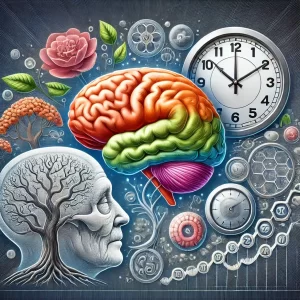
During deep sleep, the brain activates the glymphatic system, a cleaning process that removes waste products and toxins from the brain. This cleaning process is thought to play a key role in protecting against neurodegenerative diseases like Alzheimer’s.
Effects of Sleep Deprivation on Cognitive Health: Lack of sleep reduces mental clarity, memory retention, and decision-making abilities. Over time, chronic sleep loss is associated with a higher risk of cognitive decline and dementia. Studies have shown that people who experience poor sleep consistently over their lifetime have a greater chance of developing neurodegenerative diseases.
Long-Term Implications: Long-term sleep deprivation accelerates brain aging and increases the risk of memory disorders, depression, and dementia. It’s thought that sleep helps “detoxify” the brain, clearing out beta-amyloid plaques linked to Alzheimer’s. Without adequate sleep, the buildup of these proteins can contribute to cognitive decline.
Sleep Tip for Cognitive Health: Establish a regular sleep routine, as consistent quality sleep can help protect brain function over time. Avoid late-night screen exposure and practice relaxation techniques to prepare the mind for restful sleep.
By ensuring sufficient, quality sleep, you provide your body with the time it needs to recover, regulate vital processes, and maintain optimal health. Prioritizing sleep positively affects everything from immune function and heart health to weight management, hormone balance, and brain health, supporting a long and healthy life.
The Role of Sleep in Mental Health and Cognitive Function
Sleep is essential not only for physical health but also for mental and cognitive well-being. Good sleep helps regulate emotions, supports mental clarity, and strengthens memory and learning abilities. On the other hand, chronic sleep deprivation has serious effects on mood, cognitive performance, and long-term mental health, increasing the risk of mental health disorders. Here’s a closer look at how sleep affects our minds and emotions.
1. Sleep and Emotional Regulation
How Sleep Supports Emotional Balance: During sleep, particularly during REM (Rapid Eye Movement) sleep, the brain processes and regulates emotions. This stage of sleep is where the brain consolidates emotional experiences, helping us to interpret and manage them effectively. REM sleep also allows the brain to “replay” and sort through emotional events from the day, which helps reduce the emotional impact of these experiences, making it easier to face new challenges with a balanced perspective.
Effects of Sleep Deprivation on Emotions: When we don’t get enough sleep, we tend to be more emotionally reactive, irritable, and sensitive to stress. Studies show that sleep deprivation affects the amygdala, the part of the brain that processes emotions. Without adequate sleep, the amygdala becomes more reactive, which is why people who are sleep-deprived often experience heightened emotions and may respond to minor issues with frustration or anger.
Long-Term Implications: Chronic sleep deprivation can make it challenging to manage stress and control emotions, leading to mood disorders like anxiety and depression. Poor emotional regulation also affects social relationships and work performance, as a lack of sleep can lead to increased conflict and reduced patience.
Sleep Tip for Emotional Health: Aim to get 7-9 hours of sleep each night, and try to include a regular relaxation practice before bed, such as deep breathing, journaling, or listening to calming music. These habits help the brain prepare for REM sleep, supporting emotional balance.
2. Sleep and Mental Health Disorders
How Sleep and Mental Health Are Connected: Sleep is closely linked with mental health, and the relationship goes both ways: poor sleep can contribute to mental health issues, and mental health problems often disrupt sleep.
This creates a cycle where sleep problems exacerbate mental health issues and vice versa. For instance, conditions like anxiety, depression, bipolar disorder, and PTSD are all associated with disrupted sleep patterns, especially insomnia.
- Anxiety: People with anxiety often experience racing thoughts or constant worry, making it hard to fall asleep. Lack of sleep, in turn, heightens anxiety levels, creating a vicious cycle.
- Depression: Sleep disturbances are a common symptom of depression, with many people experiencing insomnia or, conversely, hypersomnia (sleeping too much). REM sleep is particularly affected, with disrupted sleep cycles worsening depressive symptoms.
- Bipolar Disorder: Sleep patterns vary dramatically in bipolar disorder, with insomnia often occurring during manic episodes and excessive sleep during depressive episodes. Regular sleep is crucial in managing mood stability.
- PTSD (Post-Traumatic Stress Disorder): People with PTSD often experience nightmares, night sweats, and flashbacks, leading to disturbed sleep. These symptoms, in turn, worsen PTSD, making it difficult to recover.
Effects of Sleep Deprivation on Mental Health: Lack of sleep leads to increased production of stress hormones like cortisol, which heightens feelings of anxiety. Poor sleep also decreases serotonin and dopamine levels, affecting mood and leading to feelings of sadness or hopelessness. Chronic sleep deprivation worsens symptoms of mental health disorders and makes it harder for individuals to respond to therapy or medications effectively.
Sleep Tip for Managing Mental Health Disorders: For those dealing with mental health issues, establishing a consistent sleep routine and practicing good sleep hygiene are essential. Consider talking with a mental health professional or a sleep specialist, as treating sleep disorders often improves overall mental health.
3. Sleep and Cognitive Function
How Sleep Supports Cognitive Abilities: Sleep plays a key role in memory consolidation, problem-solving, and overall cognitive performance. During sleep, especially during deep sleep and REM, the brain organizes information from the day, helping to transfer short-term memories into long-term storage. Sleep also allows the brain to clear out waste, creating an optimal environment for focus and learning the next day.
- Memory Consolidation: Throughout the night, the brain processes and organizes new information, strengthening neural connections involved in learning. Deep sleep is particularly important for consolidating declarative memories (facts and information), while REM sleep helps with procedural memory (skills and tasks).
- Problem-Solving and Creativity: During sleep, the brain integrates new information with existing knowledge, which can help with creative thinking and problem-solving. This is why we often “sleep on” a problem and find new insights or solutions in the morning.
- Focus and Attention: Quality sleep improves focus, attention, and reaction times. Poor sleep, on the other hand, impairs the ability to concentrate, slows down thinking, and increases mistakes.
Effects of Sleep Deprivation on Cognitive Abilities: Sleep deprivation impairs memory, attention, and decision-making. The prefrontal cortex, which controls higher cognitive functions like reasoning and impulse control, is especially affected. This is why sleep-deprived individuals often struggle with complex tasks, memory recall, and focusing on details. Over time, chronic sleep loss can lead to a reduction in brain volume, particularly in areas responsible for memory and learning.
Long-Term Implications: Lack of sleep has been linked to cognitive decline and an increased risk of neurodegenerative diseases like Alzheimer’s disease. The glymphatic system, active during deep sleep, helps clear waste products like beta-amyloid from the brain. Without adequate deep sleep, these waste products can accumulate, contributing to the development of dementia.
Sleep Tip for Cognitive Health: Prioritize 7-9 hours of sleep, especially before exams or important tasks. Taking short naps (10-20 minutes) during the day can also enhance focus and memory, especially if you’re unable to get a full night’s sleep.
4. Sleep and Stress Resilience
How Sleep Enhances Stress Management: Quality sleep supports stress resilience by regulating stress hormones and balancing mood. Deep sleep and REM sleep help reduce cortisol, the body’s primary stress hormone. When you’re well-rested, the brain can manage emotional responses more effectively, making it easier to handle challenges and recover from stress.
Effects of Sleep Deprivation on Stress: Without enough sleep, cortisol levels can remain elevated, increasing stress levels and making it harder to relax. High cortisol disrupts the body’s ability to cope with stress, leading to irritability and heightened sensitivity to daily challenges. Additionally, when the brain doesn’t have enough time in REM sleep to process emotions, it becomes more reactive and less able to regulate negative thoughts.
Long-Term Implications: Chronic sleep loss and stress create a cycle that can lead to burnout, a condition where individuals experience physical, mental, and emotional exhaustion. Burnout is associated with reduced motivation, decreased productivity, and impaired mental health.
Sleep Tip for Managing Stress: Engage in relaxing activities before bed, like reading, deep breathing, or progressive muscle relaxation. These practices help lower cortisol levels, preparing the body for restorative sleep and helping improve stress resilience.
5. Sleep and Decision-Making
How Sleep Supports Rational Thinking: Sleep helps the brain recharge and process information, leading to improved decision-making, especially in complex or emotionally charged situations. During sleep, the brain strengthens connections in the prefrontal cortex, the area responsible for rational thinking and impulse control. REM sleep also plays a role in reinforcing memories and integrating information, which helps with planning and decision-making.
Effects of Sleep Deprivation on Decision-Making: Lack of sleep weakens the prefrontal cortex, leading to impulsivity and poor judgment. Studies show that sleep-deprived individuals are more likely to make risky decisions or act without fully considering consequences. This is because the amygdala, the part of the brain responsible for emotional reactions, becomes more active, while the prefrontal cortex (responsible for impulse control) is less active.
Long-Term Implications: Chronic sleep deprivation impairs judgment and decision-making, leading to increased risk of accidents and poor life choices, from financial decisions to social interactions. For individuals in high-stakes environments (like healthcare, law enforcement, or finance), this can have significant professional and personal consequences.
Sleep Tip for Improved Decision-Making: Ensure you get adequate rest, especially before making important decisions. Practicing mindfulness and meditation can also improve decision-making by helping the brain process emotions and reducing impulsivity.
Tips for Better Sleep
Improving sleep quality often comes down to creating a consistent routine, cultivating a calming sleep environment, and incorporating practices that help the mind and body unwind.
Here are detailed strategies to help you get the best rest possible.
1. Create a Relaxing Pre-Sleep Routine
Why It Helps: A pre-sleep routine signals to your brain that it’s time to wind down. By following the same activities each night, you help your body transition smoothly into sleep mode.
Steps to Try:
- Set a Regular Bedtime: Going to bed and waking up at the same time each day reinforces your body’s internal clock, making it easier to fall asleep and wake up refreshed.
- Wind Down with Calming Activities: Try reading a book, doing gentle yoga, or listening to relaxing music about an hour before bed.
- Avoid Stimulating Activities: Steer clear of intense workouts, work emails, or emotionally charged discussions late at night, as they can make it harder to relax.
2. Optimize Your Sleep Environment
Why It Helps: A cool, dark, and quiet bedroom creates the ideal setting for deep, restful sleep by minimizing distractions.
Steps to Try:
- Keep the Room Cool: Aim for a room temperature between 60-67°F (15-19°C), as the body’s temperature naturally drops during sleep.
- Block Out Light: Use blackout curtains or wear an eye mask to block light, as darkness signals the brain to produce melatonin, the sleep hormone.
- Minimize Noise: Use earplugs or a white noise machine to mask sounds that could disrupt sleep, especially in noisy neighborhoods.
3. Limit Screen Time Before Bed
Why It Helps: Screens emit blue light, which can suppress melatonin production, making it harder to fall asleep.
Steps to Try:
- Reduce Screen Exposure an Hour Before Bed: Try to put away phones, tablets, and computers at least an hour before bedtime.
- Use Night Mode or Blue Light Filters: If screen use is unavoidable, enable night mode or use blue light-blocking glasses to reduce the impact on sleep.
- Try Non-Screen Activities: Swap screens for activities like journaling, reading a physical book, or meditating to wind down.
4. Watch Your Caffeine and Alcohol Intake
Why It Helps: Both caffeine and alcohol can disrupt sleep quality, even if they don’t prevent you from falling asleep initially.
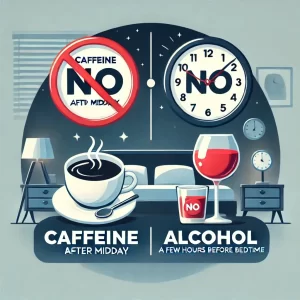
Steps to Try:
- Limit Caffeine After 2 PM: Caffeine stays in your system for several hours, so avoid coffee, tea, chocolate, and soda in the late afternoon and evening.
- Moderate Alcohol Intake: While alcohol may make you feel sleepy, it disrupts REM sleep, reducing overall sleep quality. Try to finish any drinks at least three hours before bed.
5. Get Physical Activity During the Day
Why It Helps: Regular exercise promotes better sleep quality and can make it easier to fall asleep, as it reduces stress and stabilizes mood.
Steps to Try:
- Exercise Earlier in the Day: Morning or afternoon exercise is ideal, as vigorous workouts close to bedtime can be too stimulating.
- Include Relaxing Evening Activities: If you prefer evening exercise, opt for relaxing activities like stretching, yoga, or a light walk to promote relaxation.
6. Manage Stress and Anxiety
Why It Helps: Chronic stress and anxiety are common sleep disruptors, as they keep the mind engaged and make it harder to relax.
Steps to Try:
- Practice Relaxation Techniques: Techniques like deep breathing, progressive muscle relaxation, and guided meditation can help calm the nervous system.
- Write Down Worries Before Bed: Journaling about concerns or to-dos before bed can help clear your mind and reduce nighttime worry.
- Consider Therapy: Cognitive-behavioral therapy for insomnia (CBT-I) can be especially helpful for those with anxiety-related sleep issues.
7. Limit Naps and Regulate Daytime Sleepiness
Why It Helps: While naps can be refreshing, long or late naps can make it harder to sleep at night.
Steps to Try:
- Keep Naps Short: Limit naps to 10-20 minutes if you feel sleepy during the day.
- Nap Earlier in the Day: If you need to nap, do it in the early afternoon, so it doesn’t interfere with nighttime sleep.
Frequently Asked Questions (FAQ) on Sleep
1. How Many Hours of Sleep Do I Need?
Most adults need 7-9 hours of sleep each night. Individual needs vary, so pay attention to how you feel; if you’re consistently tired during the day, you may need more sleep.
2. Can You Catch Up on Sleep Debt?
It’s possible to catch up on small amounts of missed sleep with extra rest over the weekend. However, long-term sleep debt can’t be fully “repaired,” and regular, consistent sleep is best for long-term health.
3. What’s the Best Sleeping Position?
The best sleeping position depends on comfort and any health issues you have. Sleeping on your back with a supportive pillow can help align the spine, while side-sleeping is generally recommended for those with sleep apnea or acid reflux. Stomach sleeping is typically discouraged, as it can strain the neck and back.
4. Why Do I Keep Waking Up at 3 AM?
Waking up at the same time each night can be due to stress, caffeine, or disruptions in your sleep cycle. If it’s a persistent problem, try adjusting your sleep routine and reduce caffeine intake, or talk with a sleep specialist.
5. Are Naps Good or Bad?
Short naps (10-20 minutes) can be beneficial, especially if you’re sleep-deprived. Long naps (over 30 minutes) may cause grogginess or interfere with nighttime sleep. Keep naps early in the afternoon to prevent interference with your regular sleep schedule.
6. Do I Really Need to Avoid Screens Before Bed?
Yes, screens emit blue light that can interfere with melatonin production, delaying sleep onset. If possible, avoid screens an hour before bed. If you need to use screens, consider blue light-blocking glasses or software to reduce blue light exposure.
7. How Does Eating Late at Night Affect Sleep?
Eating large meals close to bedtime can cause indigestion and disrupt sleep. Aim to finish dinner at least 2-3 hours before bed and choose a light snack if you’re hungry closer to bedtime.
8. Does Alcohol Help You Sleep?
While alcohol can make you feel sleepy, it disrupts the natural sleep cycle, particularly REM sleep, and can lead to poor-quality rest. It’s best to finish any drinks at least a few hours before bed.
9. What Can I Do if I Can’t Fall Asleep?
If you’re struggling to sleep, get up after 20 minutes and do a calming activity (like reading) in dim lighting until you feel sleepy. Avoid watching the clock, as this can increase stress around sleep.
10. Should I See a Doctor for Sleep Problems?
Yes, if you have ongoing issues with insomnia, loud snoring, or frequent daytime sleepiness, it’s best to consult a sleep specialist. Conditions like sleep apnea, restless legs syndrome, and chronic insomnia benefit from professional treatment.
Wrap-Up of What is Sleep
Sleep is a cornerstone of health, impacting every system in the body. From physical health and immune function to emotional balance and cognitive performance, quality sleep supports a vibrant, well-rounded life.
Prioritizing sleep isn’t just about avoiding daytime grogginess—it’s about giving your body and mind the time they need to reset, repair, and recharge.
Whether you’re struggling with a sleep disorder, adjusting your bedtime routine, or simply aiming for a healthier lifestyle, understanding the science of sleep and the various factors that influence it is empowering.
Implementing even a few of the tips in this guide can make a significant difference in your sleep quality, energy levels, and overall well-being.
Disclaimer: The content on this blog is for informational and educational purposes only and is not a substitute for professional medical advice. Always speak with your doctor or sleep specialist before starting, stopping, or changing any treatment or therapy related to sleep apnea or CPAP use.

